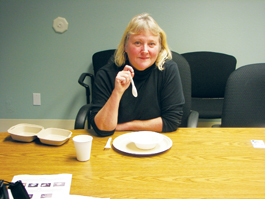home | metro santa cruz index | news | santa cruz | news article

Photograph by Steve Hahn
Can You Dig It?: Chris Moran recycles an assortment of plant-based dishes and cutlery in her home compost and thinks the city can do the same.
Dirty Little Surprise
Santa Cruz's new Styrofoam bans aren't just better for the ocean, they're a boon for the buttercups.
By Steve Hahn
When the Santa Cruz City Council decided to ban polystyrene (better known as Styrofoam) to-go containers on Jan. 22, ocean stewardship was the concept of the night. But in outlawing the squeaky stuff, city mothers and fathers are also adding to a future steaming pile of compost. And that's a good thing.
With the new ordinance, which would fine food service providers for using polystyrene, the city hopes to promote the use of biodegradable containers that could one day be delivered to a city-managed compost pile, thereby reducing the waste stream while simultaneously increasing compostable material.
The persistent nature of polystyrene products has long been a thorn in the side of landfill managers because they're nearly impossible to recycle and never break down. Chris Moran, the city's waste reduction manager, is confident the new to-go containers—made of corn starch, tapioca, sugarcane stalk, rice and other biodegradable materials—will add value to compost. She's able to make such a bold proclamation because she already composts corn-based forks and potato-based plates at home.
"I do industrial-strength composting at home," she says with a smile. "I have to say it's one the most enjoyable things I do. It's good for the environment and great for gardens. You're putting nutrients back into the soil, instead of robbing it."
Moran has noticed that the tall bearded irises she grows and sells on a small scale at her Ben Lomond home do extremely well after being fed a compost mix made up in part of old plates and forks. What's more, she doesn't have to spend a dime on fertilizer, and she uses less water because the compost retains moisture.
"Organic material is not garbage, it's gold! It's time we started treating it like that," she says.
While Moran's personal composting operation has been up and running for years, the city's compost pile is still at least two years away. Challenges include looking for a good location and making connections with farmers or gardeners who may want to use the compost on their plants.
In the meantime, the city offers a $40 discount on composting bins for residents. Moran emphasizes that any diversion of organic material into compost will help keep costs down for the city. She estimates 35 percent of the city's waste stream is organic material, and that's after landfill managers already reduced waste by over 50 percent, as mandated by California's 1989 Integrated Waste Management Act.
Moran insists that using the biodegradable polystyrene alternatives, locally distributed by Coast Paper and Ledger's, is a win-win for anyone throwing a garden party.
"If you're having a picnic, a party or even a wedding, you can take the food waste and the paper plates you've used and put them all in your home composting bin," she says.
After six to nine months, that food-and-plate compost will be ready for the garden, making the setting for your next backyard get-together all the more attractive.
Santa Cruz's polystyrene ban comes on the heels of last year's ban by the city of Capitola. Other cities to institute a ban include Oakland, San Francisco and Berkeley, among others.
As of presstime, the Santa Cruz County Board of Supervisors was set to consider a polystyrene ban for unincorporated areas at its Jan. 29 meeting. If passed, the ban would be very similar to the city's, due to the fact that both ordinances were written in the same room.
Patrick Matthews, the county's solid-waste manager, hopes the new to-go containers will allow the county to expand composting operations now in the pilot stage. The county currently operates a program in which Green Waste Recovery picks up food scraps at designated food service establishments and delivers them to Vision Recycling's compost site at the Buena Vista landfill. The county also contracts with the nonprofit Organic Recyclers Anonymous to set up on-site composting for businesses. So far, about 30 businesses are participating in both programs. If the county's ordinance passes, those corn forks, paper straws and sugarcane cups will be thrown into the food scrap pile as well. "We want to work towards diverting our waste stream to composting or recycling as much as possible," says Matthews.
For Moran, the move away from polystyrene and toward biodegradable materials, even if just done in the home, represents a much-needed shift in consciousness.
"We need to start putting things back into the soil," says Moran. "[When you do] you're creating your own microcosm of how the world should be running right now."
Send a letter to the editor about this story.
|
|
|
|
|
|